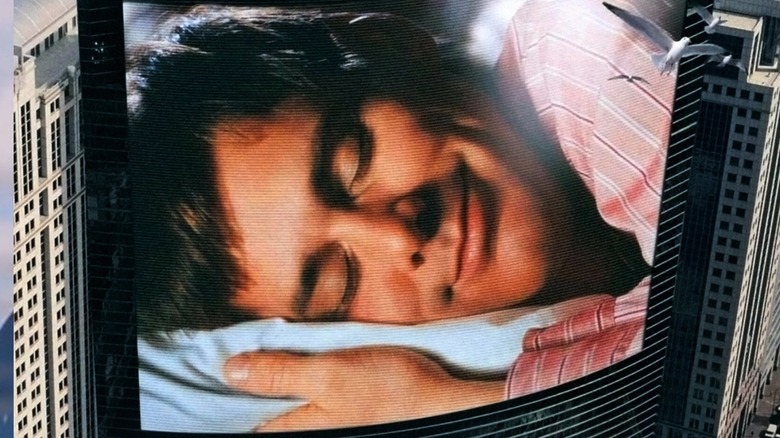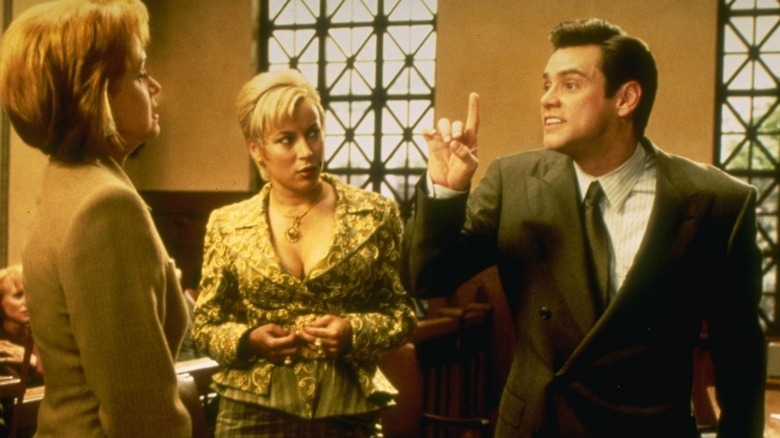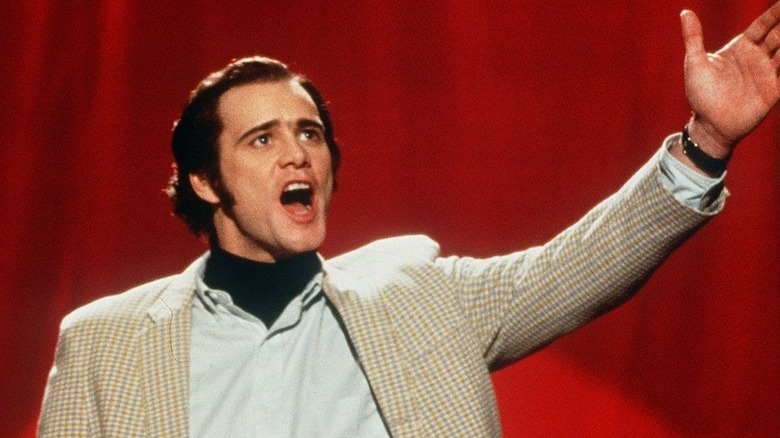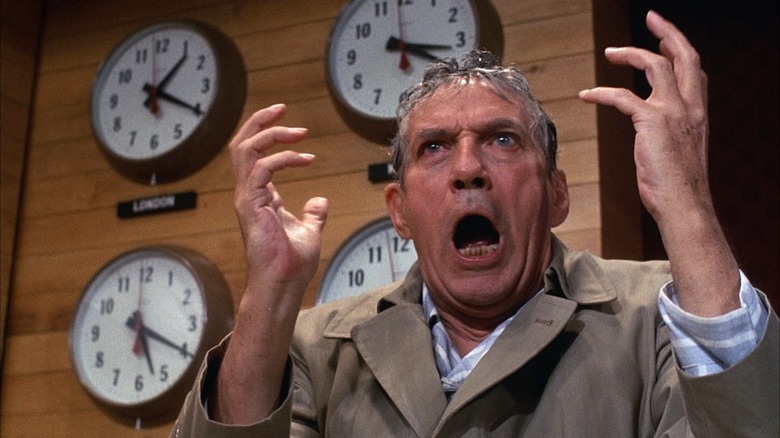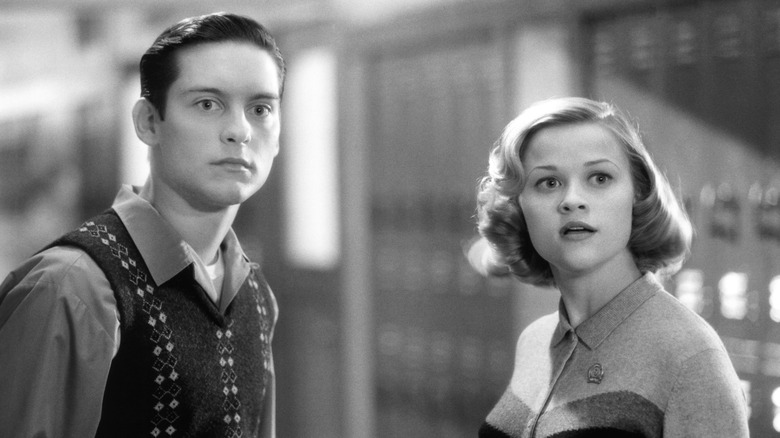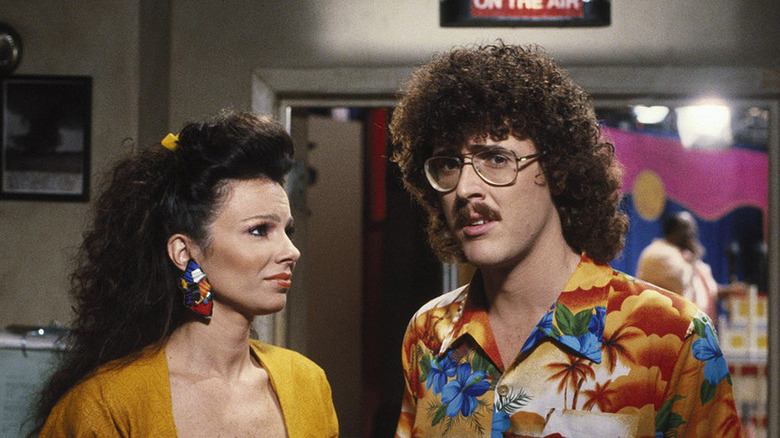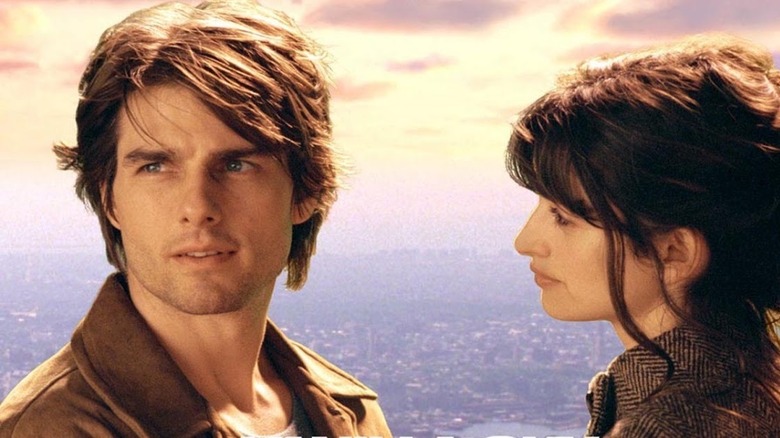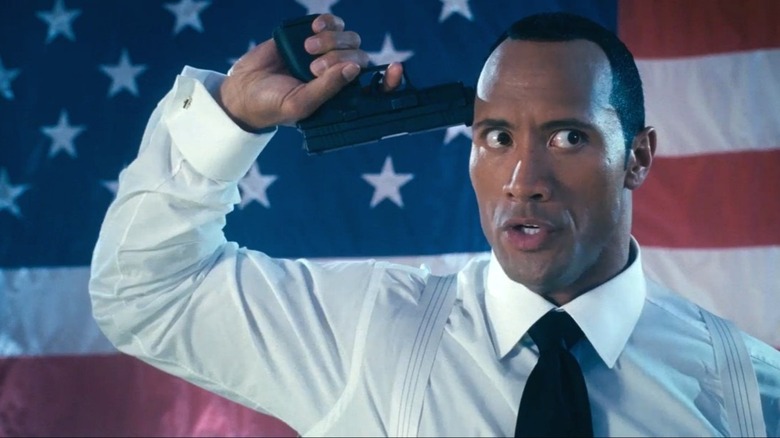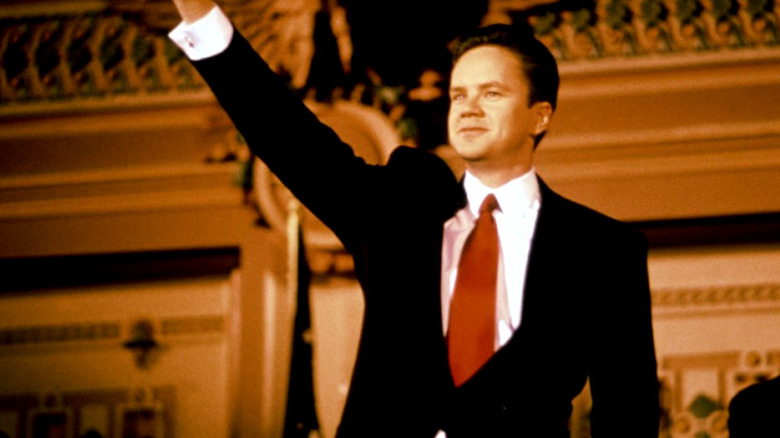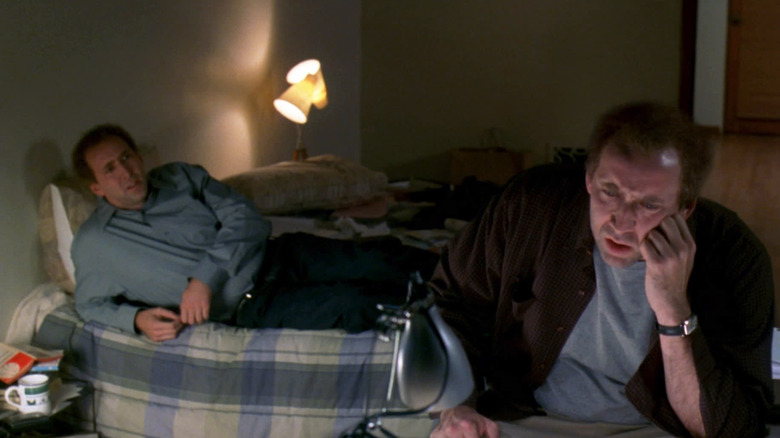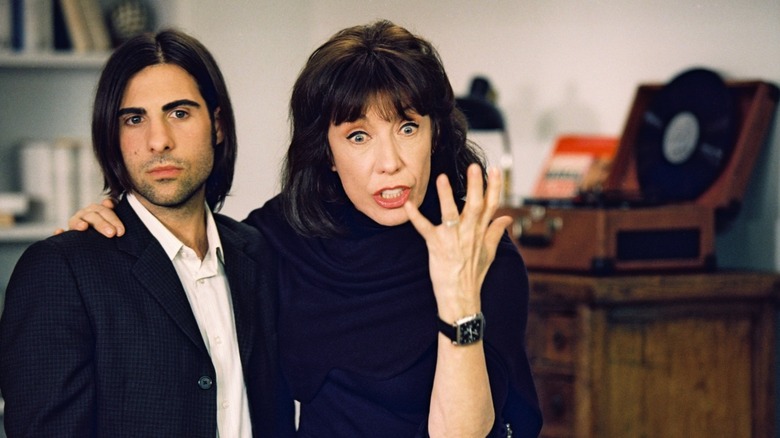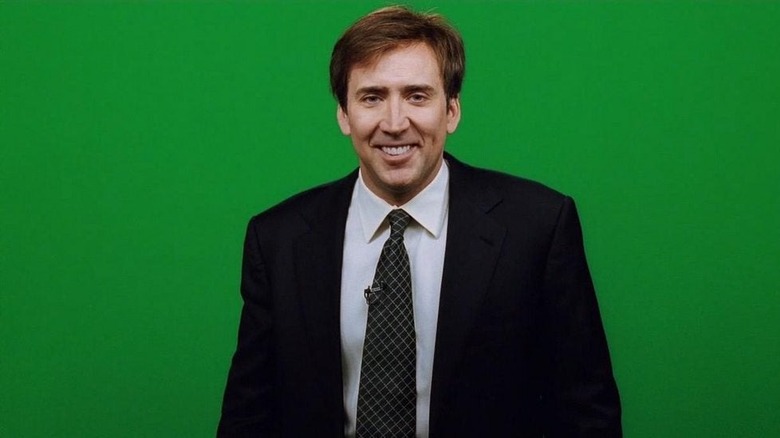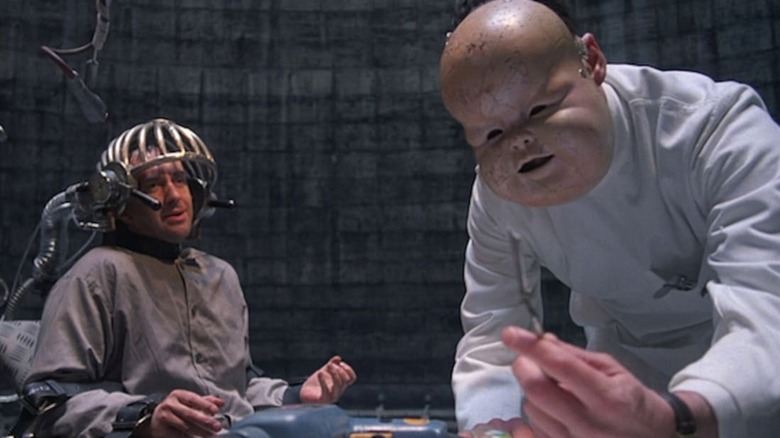Movies Like The Truman Show You Should Definitely Watch
"The Truman Show" is one of the most unique films of the '90s. While the film is witty and deeply satirical of the American public's obsession with television and celebrity, it also explores dark psychological themes of paranoia, neglect, and self-sacrifice. The film's 1998 release came at the height of Jim Carrey's career, as he had appeared in a series of comedy hits that made him one of the biggest stars in Hollywood. With "The Truman Show," Carrey proved that he had a dramatic side as well, and gave a sensitive, mature performance.
Carrey stars as Truman Burbank, the unknowing star of the world's most popular television series, "The Truman Show." The show is syndicated as a 24-hour program that shows every aspect of Truman's existence with complete authenticity, as Truman is deceived into thinking that he lives a normal life. However, Truman's hometown is a giant set populated with actors who play the residents. The series' creator Christof (Ed Harris) manipulates events from afar, and controls the storyline. Truman begins to question the nature of his reality as he witnesses a series of strange occurrences and finds that he's unable to leave, despite his dreams of traveling to Fiji.
Truman's journey to break free from the show is both amusing and heartbreaking. It's humorous to see how the "Truman obsession" sweeps the nation, but Truman's sense of futility is dramatically conveyed. "The Truman Show" was ahead of its time, and its themes are still relevant today; if you loved "The Truman Show," then these other films are definitely worth watching.
Liar Liar
The dramatic weight of "The Truman Show" came as a shock to Carrey fans considering his comedy background, but Carrey's skills aren't limited to the type of one-liners that most mainstream movie stars routinely deliver. His genius is in his ability to create compelling characters trapped in extreme circumstances. Carrey's most memorable roles, both comedic and dramatic, are those where he's dealing with an impediment that can't easily be explained. Whether it's watching his memories fade in "Eternal Sunshine of the Spotless Mind," donning the persona of a wacky superhero in "The Mask," or just being a dimwit in "Dumb and Dumber," Carrey can humanize characters that an audience wouldn't normally relate to.
"Liar Liar" features one of Carrey's most wildly eccentric performances, and it's a case where he elevates the material; the script itself is predictable and fairly saccharine, but Carrey's complete commitment to the absurdity makes the studio comedy much more interesting than it would be otherwise. He stars as Fletcher Reede, a shady lawyer who couldn't give straight facts to save his life. Fletcher's only redeeming factor is his love for his young son Max (Justin Cooper), but the only thing Max wants is for his father to be honest.
Max gets his wish when Fletcher is cursed to only tell the truth, and his entire world changes overnight when he starts being honest with his clients. Whether it's a nasty insult or an emotional confession, Fletcher is forced to pour his heart out.
Man on the Moon
"The Truman Show" was the perfect role for Carrey because he got to merge his dramatic and comedic sensibilities. While the situation Truman is dealing with is traumatizing and leaves him paranoid, neglected, and misunderstood, many of the outrageous situations the television show forces him into are amusing. In particular, Truman is confused about the constant product placement in his daily life, as the show incorporates in-world advertising since it doesn't take commercial breaks. Truman is giving a performance and selling ads, even when he doesn't realize it.
Carrey followed up "The Truman Show" with another great performance during which he also mixed genres. "Man on the Moon" sees him play the ultimate performer: experimental comedian Andy Kaufman. Kaufman was notorious for never breaking character, and kept gags running over several years without informing the audience. Unbound by the standard definitions of comedy, Kaufman felt out of place on the network sitcom "Taxi," where he was forced to deliver studio-mandated gags and one-liners. He developed a unique brand of anti-comedy and was unafraid to play the villain; his comments about women were often vile, and he maintained a recurring rivalry with WWE's Jerry Lawler.
It's a challenging part that only Carrey could have played. Truman struggles because his sincerity is witnessed by a returning audience every week, yet Kaufman has the opposite problem: When he's diagnosed with terminal cancer, he can't get anyone to take him seriously.
Network
"The Truman Show" feels relevant to this day for its sharp satire of media overconsumption from the American public. Throughout Truman's adventures and discoveries, the film cuts to various viewers who base their whole lives around watching him. Director Peter Weir depicted the over-commercialization of Truman's image in a similar fashion to the way actual '90s shows were marketed, making the film a unique time capsule. In many ways, the film's ruthless depiction of reality television feels prophetic today.
Crafting a media satire that's both specific to its time and speaks to universal themes is a challenge, but Sidney Lumet's award-winning classic "Network" is one of the greatest films ever made for that exact reason. Its depiction of extreme circumstances in 1976 wouldn't feel abnormal today, and as a result, the chilling message of "Network" is even more impactful. "Network" has a similar tone to "The Truman Show." It's consistently humorous thanks to the clever dialogue, but it's only when viewers stop to think about why they're laughing that the terror sets in.
"Network" follows the crew of a broadcast news program on the fictional USB network, which is struggling with poor ratings. The lead anchor, Howard Beele (Peter Finch), has a mental breakdown live on the air, promising that he'll commit suicide on a future show. Seeing the boost in ratings, his crew decides to keep the program running.
Pleasantville
The television satire in "The Truman Show" is effective because it's shown from multiple perspectives. Truman is, of course, unaware that he's constantly being filmed, and as a result he simply accepts the strange events that occur as part of his accepted reality. However, the film is also empathetic to the actors who are forced to lie to Truman. Truman's onscreen wife Hannah Gill (Laura Linney) struggles to have an intimate relationship with a man she's forcibly married to, and Truman's best friend Louis Coltrane (Noah Emmerich) feels guilty about manipulating him. Most heartbreaking is Truman's childhood romantic fling Sylvia (Natascha McElhone); Sylvia actually loves Truman, but can't be with him because she's not part of the approved storyline.
The 1998 satirical comedy "Pleasantville" examined the idealism of '50s sitcoms in a similar fashion, showing the perspectives of both the aware and the ignorant. The film follows modern day high school siblings David (Tobey Maguire) and Jennifer (Reese Witherspoon), who are constantly bickering. David is obsessed with a classic sitcom called "Pleasantville" and obsessively watches it, where Jennifer is popular at school and annoyed by her geeky brother.
A magical occurrence transports the two to the black-and-white world of "Pleasantville," where their modern beliefs are out of place in the antiquated community. "Pleasantville" examines why social standards have changed, as the constraints of the older era keep the residents from freely expressing their opinions and emotions.
UHF
The relationship between television production crews and the network that controls them is paramount in "The Truman Show." Christof controls the central narrative in Truman's life, and manipulates the actors' behavior so that they'll follow his ideas about where the story should go. Christof also creates scenarios in order to prevent Truman from leaving the set. He sets up a traumatic childhood memory in which Truman's father is killed in a boating accident, leaving Truman terrified of traveling by water. When his father is accidentally recast as a beggar and Truman is shocked to see him, Christof explains it away through an amnesia storyline. Christof is a compelling villain because he justifies all of his actions as an extension of his creative genius.
The 1989 cult comedy "UHF" explores similar themes of network pressure on individual artistry, and, like "The Truman Show," it's a routinely hilarious film that makes a larger point. The film was written, produced, and composed by star "Weird Al" Yankovic, one of the rare comedic forces as talented in concocting a persona as Carrey. Yankovic stars as George Newman, who unexpectedly earns the right to run his own television station after his uncle wins a failing network in a poker tournament. Idealistic and ambitious, George develops a unique UHF station that features bizarre variety shows and other oddball programs. George faces pressure from rivals that aim to steal his airtime, and his loyal audience isn't able to save his show from cancellation.
Vanilla Sky
One of the core themes of "The Truman Show" is how people choose to accept the reality that they're exposed to. Truman struggles because he's accepted a version of events that is obviously ludicrous, but the only contrasting viewpoints available to him come from the actors on the show, who tell him that nothing is abnormal. Truman doesn't know who he can trust, and begins to question his own sanity. It's a deeply psychological story that's sympathetic to the stigmas Truman faces.
Cameron Crowe's 2001 science-fiction mystery "Vanilla Sky" explores similar concepts of illusion, reality, and perspective. The film follows haughty publishing tycoon David Aames (Tom Cruise), who recounts the strange events that left him disfigured to the prison psychologist Dr. Curtis McCabe (Kurt Russell). David explains that his girlfriend Julia Gianni (Cameron Diaz) grew jealous of his affair with the enigmatic Sofia Serrano (Penelope Cruz) and forced them into a car accident, killing herself. The events send David's life spiraling out of control, and the story is told nonlinearly to highlight his confusion. By showing the events from David's perspective, Crowe makes him more sympathetic, similar to the emotional weight that Truman's journey carries.
Both films mix genres. "Vanilla Sky" features many graphic love scenes, making it akin to a sexual thriller, but it also features body horror as David is forced to live wearing a mask. David's wisecracking best friend Brian Shelby (Jason Lee) adds a humorous element, and even more absurd comedy occurs amidst David's lucid dreaming.
Southland Tales
"The Truman Show" was instantly acclaimed for its sharp mix of comedy and drama, earnest performances, and brilliant concept. It was among the best-reviewed films of 1998 and earned Academy Award nominations for best director (Peter Weir), best adapted screenplay (Andrew Niccol), and best supporting actor (Ed Harris). However, the film's forward-thinking nature was only evident after a longer period of time.
Not every prophetic satire earned the same instant praise; Richard Kelly's brilliant sci-fi comedy-drama "Southland Tales" had a famously disastrous reputation. The film earned horrible reviews when it debuted at the 2006 Cannes Film Festival, and its release date was pushed until December 2007. Kelly was forced to significantly edit the film down. However, in the years since its release the film has gained a cult appreciation for its novel look at the intersection between celebrity culture, politics, militarization, and alternate realities.
"Southland Tales" is set in an alternate version of 2008 where the United States is sharply divided by the extremist Republican Party that controls the surveillance network US-Ident and a sect of violent neo-Marxist detractors that aim to infiltrate the public through the celebrity Krysta Now (Sarah Michelle Gellar). Now has formed a relationship with Boxer Santaros (Dwayne Johnson), a prominent movie star and figure in the Republican Party who is suffering from amnesia. Now convinces Santaros that he's written a prophetic screenplay, and he researches his work with the crooked cop Roland Tavern (Sean William Scott), who discovers that he has an identical twin brother.
Bob Roberts
Among the most compelling aspects of the satire in "The Truman Show" is the depiction of the cult of personality that develops around Truman. Given the popularity of the series, Truman's fans are highly dedicated and base their entire lives on the standards that he fulfills. Truman is earnest, heartwarming, and forward-thinking, and given that he lives in an illusion, his qualities are completely authentic. As a result, he's a positive influence on his ardent followers.
Tim Robbins's 1992 satirical mockumentary "Bob Roberts" shows a more negative side to fixating on a media icon. Robbins stars as a popular singer known for his highly conservative views. After he sees weakness in the incumbent Democratic Senator Brickley Paiste (Gore Vidal), Roberts decides to run for office himself and launches a wide-ranging political campaign. He's instantly popular among both fans who love his music and conservative voters who agree with his extreme positions.
However, Roberts is quite deceptive, and begins encouraging violence during his campaign speeches. While he claims to be completely sincere, Roberts deliberately masks his sinister intentions under the guise of being an unaware celebrity, and thwarts efforts by investigative reporter Bugs Raplin (Giancarlo Esposito) to expose the truth. At first, Roberts's deflections are amusing, but they grow more chilling when Raplin uncovers his connection to a CIA drug trafficking ring. Like Carrey, Robbins is very charismatic, and the film weaponizes his endearing personality as he inspires real violence with his hate-filled words.
Adaptation
"The Truman Show" is very blunt in dealing with mental health concerns. Truman's situation causes him to grow confused and paranoid, as he's not offered a helping hand and begins to distrust the people closest to him. Truman struggles to express himself, as even though he doesn't know why, he knows that things aren't what they seem. The pressure of living up to others' expectations also haunts Truman throughout.
Spike Jonze's 2002 psychological dark comedy "Adaptation" shows a similar authenticity towards mental struggles, as the film's narratives stem from the personal musings of screenwriter Charlie Kaufman. A fictionalized Kaufman is portrayed by Nicolas Cage, who also appears as his hallucinatory twin brother Donald. Charlie struggles from writer's block and becomes highly reclusive, trapping himself in his own room as he tries to craft his next script. Charlie doesn't want to follow any established formulas, as he fears being labeled a hack. Donald moves in with him and freeloads in his house, which adds even more stress to his life. Like Carrey, Cage has built a career out of authentically depicting eccentric characters who suffer from inexplicable hardships.
Charlie wants to adapt the novel "The Orchid Thief" as his next project. As such, he must interview its author, Susan Orlean (Meryl Streep), but because of his anxiety he forces Donald to make the final approach. Donald discovers that, much like Charlie, Susan bases many of her stories on events from her life. The protagonist of "The Orchid Thief" is based on the real John Laroche (Chris Cooper), who Orlean is secretly in love with.
I Heart Huckabees
"The Truman Show" quickly develops beyond its initial conceit into something more existential and irreverent. Truman confronts the futility within his life, as he thinks (and later confirms) that his actions are being controlled by external forces he has no power over. It's a credit to the fluidity of Peter Weir's brilliant direction and the specificity of Andrew Niccol's writing that, even amidst Truman's darker moments, the film remains consistently engaging.
David O. Russell's highly underrated 2004 indie comedy "I Heart Huckabees" explores similar themes of existentialism, destiny, and futility through a darkly comedic premise. It's somewhat ironic that Russell is now best known for his Oscar bait films like "The Fighter," "Silver Linings Playbook," "American Hustle," and "Joy," as his early movies were much more experimental.
"I Heart Huckabees" follows the misadventures of untraditional detectives Bernard Jaffe (Dustin Hoffman) and Vivian Jaffe (Lily Tomlin), who are hired by wacky clients to search for the meaning of life. The incredible ensemble includes wild performances from Mark Wahlberg, Jude Law, and Naomi Watts, who shed their usual dramatic personas for roles closer to the absurdity of '90s Carrey.
The Weather Man
Despite its broad satirical elements and shocking plot twists, "The Truman Show" is earnestly emotional in its depiction of a shattering family. Truman struggles to care for his screen wife Hannah, even though he's truly in love with his college crush, Vivian, who has been kicked off the show. Hannah has her own anxieties, as she doesn't want to have a child with Truman, who is unaware of his unique situation.
Gore Verbinski's 2005 black comedy "The Weather Man" explores the television world like "The Truman Show," and filters it through the impact that it has on one specific family. David Spritz (Nicolas Cage) is the top weather reporter in the Chicago area, but he's hated by the general population and heckled in the streets. The toll of his day job makes David absent at home, and his ex-wife Noreen (Hope Davis) doesn't communicate with him. His children both suffer from mental health disorders; his daughter Shelly (Gemmenne de la Peña) deals with body image issues, and his son Mike (Nicholas Hoult) grapples with depression.
Brazil
"The Truman Show" successfully transports viewers to a distinct, idiosyncratic world. Truman's hometown of Seahaven Island is contained within a floating obelisk and surrounded by sea water, leaving the residents cut off from the real world. The excellent production design, which emulates the ideal suburban town, helps bring Truman's living space to life.
When it comes to crafting a unique environment with extravagant sets, few filmmakers are more attuned to detail than "Monty Python" alum Terry Gilliam. Gilliam's 1985 sci-fi masterpiece "Brazil" developed a dystopian future where bureaucracy reigns supreme, and the densely populated urban complexes are highly polluted. The film centers on the meek desk worker Sam Lowry (Jonathan Pryce), who learns of an impending revolution by an enigmatic resistance figure Jill Layton (Kim Griest) who haunts his dreams. Like "The Truman Show," the futurism of "Brazil" is still relevant today, and its depiction of a classist society where corporations influence social culture is painfully authentic.
